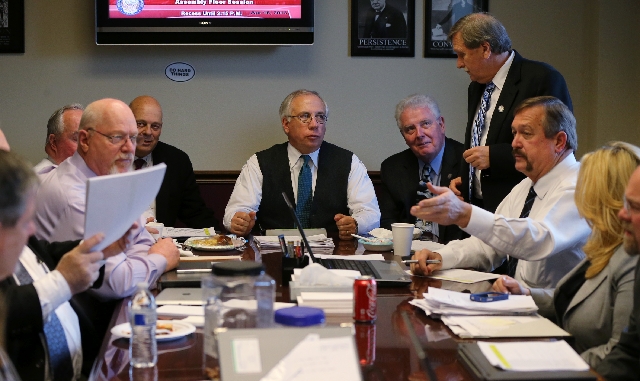The importance of pension reform
When Clark County District Attorney David Roger announced he would retire in early 2012, the top prosecutor was 50 years old. Yet he started collecting his annual pension of about $150,000 immediately upon leaving office.
Private-sector workers must wait till they’re at least 59½ to withdraw tax-deferred retirement savings (if they have any) without penalty — and that’s their own money! (Eighty-two percent of Nevada’s public employees contribute nothing at all to their pensions. The rest contribute a modest 11.88 percent of their pay.)
Private-sector taxpayers must be at least 62 to collect meager Social Security distributions, and 65 to get Medicare benefits. But the Nevada Public Employees’ Retirement System allows state and local government workers to begin collecting pension benefits at any age if they’ve worked for 30 years (25 years for public safety workers). PERS also allows government workers to purchase up to five years of service toward their retirement eligibility, at a cost of roughly one-third their current yearly salary per year of service. This lets some public safety workers retire with a full pension, payable immediately, after just 20 years of employment. All other employees can call it quits after as few as 25 years on the job.
Mr. Roger purchased five years of service to reach the 30-year mark, at a cost of about $330,000.
Without purchasing the extra five years, he would have had to wait until age 60 to begin collecting his pension, with benefits of about $130,000 per year. But Mr. Roger’s $330,000 purchase will allow him to collect 10 years of benefits worth some $1.5 million he otherwise wouldn’t be entitled to. After taxes, he recoups his service-purchase investment in about three years.
Nor was Mr. Roger required to take to his rocking chair. Unlike Social Security recipients, who lose benefits if they seek other work, Mr. Roger demonstrated himself perfectly capable of gainful employment — he immediately took another job with a public employee union.
Mr. Roger did nothing illicit or unethical. That’s just the way the current system works — a system funded by taxpayers who’ve seen their own savings and home values wiped out, who can only dream of retiring at age 65, let alone 50.
At age 75, Mr. Roger will have collected about $3.75 million in pension benefits, more than he was paid during his entire prosecutorial career.
This helps explain why, according to a study by the Nevada Policy Research Institute, PERS has unfunded liabilities of more than $40 billion, not the $10 billion reported by the agency.
Credit rating agencies report states and local governments nationwide have nearly $3 trillion in unfunded pension liabilities. Is it any wonder states all around the country are facing fiscal catastrophe if they don’t enact major reforms?
Former Clark County Manager Thom Reilly — now a professor at San Diego State University — points out Nevada ranks in the bottom fifth of states with regard to how well their pension liabilities are funded. “It is generally assumed that pensions funded at 80 percent or less have a serious problem,” Mr. Reilly notes. Nevada’s is 71 percent funded.
That’s why pension reform should have been near the top of the Legislature’s 2013 agenda. Yet Gov. Brian Sandoval stole the wind from the sails of the few lawmakers who were willing to tackle this issue when he announced support for a “review” of PERS before seeking any major changes — a review that won’t be completed till after the 2013 legislative session ends.
Will the problem be tackled after the next election? Problem is, there’s always a “next election.”
Assembly Bill 342, which would change Nevada’s traditional defined-benefit pension to a hybrid plan featuring a defined-contribution component for new hires, is still alive. Cynics warn its chances of emerging from the Democrat-dominated Assembly Ways and Means Committee would traditionally be slim.
But Nevada legislators of both parties need to get serious about reforming PERS. More than 40 states have passed some type of pension reform in recent years — under both conservative and liberal politicians. Why? Because even elected officials in such Democrat-dominated, union-friendly enclaves as Rhode Island have come to realize these pension promises will soon begin squeezing out other services taxpayers expect. The pension tweaks passed by Nevada lawmakers in 2009 don’t begin to address the depth and immediacy of the problem.
If Nevada lawmakers lack the political will to put future public-sector hires into a defined-contribution, 401(k)-style retirement system, they should at a minimum quit paying pension benefits to anyone younger than 60. Eliminate the purchase of service time. Calculate benefits over a longer work horizon. Require public employees to provide a greater share of their pension contributions.
If Nevada doesn’t follow such left-leaning states as Rhode Island — and soon — the real fiscal cliff will arrive much sooner than we’d like.






















